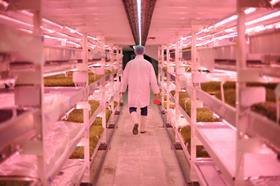
Abandoned coal mines could be transformed into huge underground farms, academics at the University of Nottingham have suggested.
In a bid to feed rising urban populations, cut CO2 emissions and boost yields, the researchersare exploring the possibility of introducing hydroponic production on a large scale underground, with the added benefit of improving food safety due to crops reduced exposure to pollution.
Theysay “cost-effective” undergroundtunnels for crop planting could be constructed using new drilling techniques, and these could be linked with existing coal mining and civil air defence tunnels, many of which are now abandoned.
Professor Saffa Riffat, project lead and chair in Sustainable Energy at the Faculty of Engineering, said: “There are millions of redundant coal mines and tunnels in the world which could be linked to new tunnels for crop production.
“In the UK there are over 1,500 redundant coal mines, and in China, there are over 12,000 abandoned coal mines (0.6 million m3), 7.2 billion m3 of tunnels and about one billion m3 of civic air defence tunnels.”
Professor Yijun Yuan, a specialist in sustainable energy and mining engineering, will work with Professor Riffat on the project, which will initially focus on the potential for the concept in the UK and China.
As proven by existing hydroponic producers, such as Growing Underground in south London, a variety of crops can be produced in subterranean vertical farms, with plants grown directly in nutrient-rich water (as opposed to soil) under coloured LED lighting.
The researchers noted that a major benefit of hydroponic production is the ability to grow all kinds of crops year-round, unaffected by climatic or seasonal restrictions. The concept would also allow crops to be produced in arid and water-deficient areas.
In addition, advanced control systems including sensors and remote controls could be used to monitor crop production, with renewable energy used to power the LED lighting needed for photosynthesis.
Comparing vertical arms to traditional greenhouses, Riffat saidvertical farms were better suited for use in cities, providing high crop yields on a small land area (or undergound).
Nevertheless, he acknowledged that vertical farming systems are expensive to manufacture and install, requiring large quantities water and energy for heating and cooling.
“They are also vulnerable to extreme weather conditions, wars and terrorism,” he added.



